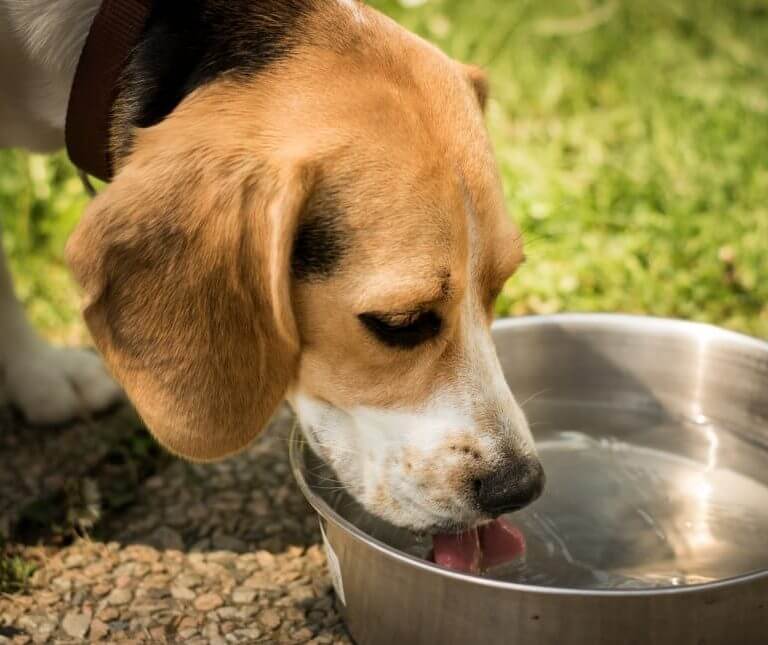Does Your Dog Drink Enough Water?

Good hydration is just as important for dogs as it is for us. While we can reason with ourselves that drinking more water is good for us, what do we do if our dog dislikes drinking the stuff? We look at the importance of good hydration, and how you can get your dog to drink more water.
The Importance of Proper Hydration
Dogs, like humans, are made up of about 60% water, with their organs consisting of up to 85% water. It aids their digestive system and the absorption of nutrients, which travel through water to the cells of their bodies. It is essential for the efficient elimination of body waste through urination and defecation. Good hydration regulates a dog’s body temperature via sweat and panting, helping them to cool down. Water lubricates their joints and insulates the organs, especially the brain, as well as the spinal cord, helping to protect them from damage.
The average dog will need about 40mL of water per kg of body weight. Factors that influence a dog’s particular hydration needs include breed, ambient temperature, sodium intake and activity levels.
A higher water intake is particularly necessary in illness, when your pup has diarrhoea or is vomiting. It helps rid the body of additional waste and bacteria.
Why Some Dogs Don’t Drink Enough Water
The movement of water is cyclical; it continually goes in one end and out the other. Exercise is a great way to stimulate the cycle, with water exiting their bodies through sweat and panting. For guardians of furry couch potatoes that lack thirst, the answer is pretty straight forward: get them moving. A short walk around the block for these languid pups may be all they need to kick start their thirst.
As dogs age they sometimes avoid drinking water. The process of getting up for a drink of water becomes too tiring. Their thirst isn’t quite worth the effort, or their sense of thirst may be diminishing.
Another more serious reason some dogs don’t drink enough has to do with a health problem. If your dog is neither lazy nor old, take them to your veterinarian. A lack of hydration can worsen a bladder infection, and kidney disease and diabetes can cause a dog’s thirst to diminish altogether.
Finally, your pup may have a fear of water. They may associate drinking water with bad experiences, disturbing their need to drink water. This is very rare, but if this is your situation, a dog behaviourist can help. A dog behaviourist will use training, desensitisation techniques and tweaks to your habits to help your dog overcome their fear.
To help your precious pooch, follow these tips to increase their water intake.
1. Clean Water Bowl
A clean water bowl can make an instant change to your dog’s approach to drinking water. Wash their water bowl daily and fill it with fresh water.
2. Exercise
How much exercise a dog needs depends upon their age and stage of life, breed and activity levels. If your dog isn’t exercising enough, they will lose stimulation of that body hydration cycle. Read What a Dog Wants for more information on a dog’s exercise and happiness.
3. Moist Food
A thirsty dog on a dry food diet needs a change, which may need to happen gradually. Replace a quarter of their dry food with wet food, and increase by one quarter as it is tolerated – some dog’s tummies are more sensitive to changes in diet than others. Another trick is to soak their dry food in water. These things can help increase their hydration.
4. More Water Bowls
Try using multiple water bowls. For example, as well as next to their food bowl, keep one or two water bowls outside, in the laundry or even try the bathroom – a trick that works for this writer’s pup.
5. Flavouring
Adding low sodium chicken or bone broth to your dog’s water may make it more appetising. Use one formulated for dogs, choose one with no onions or other alliums in the ingredients, or make one yourself. Boil a chicken carcass in a large pot of water for at least three hours and allow to cool. It will keep in the fridge for four days. Read the ‘Human foods’ section in 14 Common Household Hazards for more information on food dangers for your dog.
Hydration is vital for a happy and healthy dog. As always, see your veterinarian to eliminate any serious health concerns, and follow these tips to help your dog live their life to the fullest.
